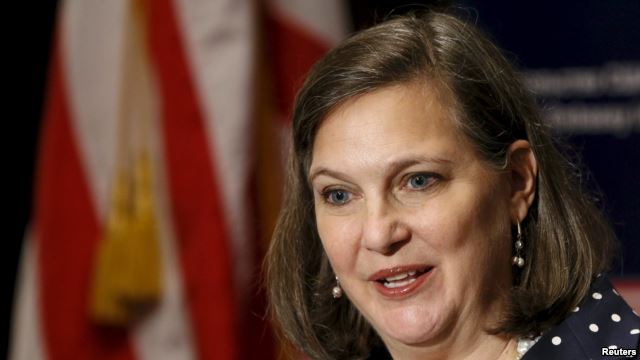WASHINGTON — A top U.S. official says economic sanctions continue to be the most powerful leverage Washington has over Russia, and that those measures have thwarted potential Russian efforts to seize larger swaths of Ukrainian territory, including the capital.
Victoria Nuland, assistant secretary of state for European and Eurasian Affairs, also told lawmakers on June 7 that Moscow remained in violation or “out of compliance with” some major arms-control treaties, including the 1987 Intermediate-Range Nuclear Forces Treaty, known as the INF.
Coming just weeks before an important NATO summit in Warsaw, Nuland’s comments before a Senate committee gave some indication of what that summit’s agenda will include, with Russian military maneuvers in Eastern Europe and the Middle East likely to take center stage.
That summit will be preceded by a meeting of European Union leaders in Brussels, where officials are expected to renew sanctions against Russia that were imposed alongside analogous U.S. measures following Moscow’s forcible annexation of Ukraine’s Crimea Peninsula in 2014.
U.S. and European officials have linked the lifting of those sanctions — which, together with the drop in world oil prices, have pummeled the Russian economy — to the implementation of the Minsk cease-fire accords aimed at resolving the conflict between Russia-backed separatists and Kyiv’s forces in eastern Ukraine.
“I think the largest piece of leverage that we have on Russia is the sustainment over two years of deep and comprehensive sanctions across the U.S. and the EU countries,” Nuland told the Senate Foreign Relations Committee.
“So again this is why we are advocating — because Minsk is not being implemented — that the sanctions have to be rolled over again,” she added.
Pressed by Senator Marco Rubio (Republican-Florida) about the effectiveness of the sanctions, Nuland insisted that they have impacted Russian policy.
“We have deterred further land grabs in Ukraine, and that was a real risk when we first started with sanctions — that they would try to run all the way to Kyiv and Kharkiv,” she said. “I will tell you now that the Russians are now openly talking about the pain of sanctions, including when we work with them on the Minsk thing. So they know what it’s going to take to get these sanctions rolled back.”
Michael Carpenter, a top Russia official from the Defense Department who also testified before the committee, warned that Russia was adding more weaponry and military capability to the Black Sea peninsula in an effort to prevent the United States or its allies from operating in the region.
Both Nuland and Carpenter were also pressed by senators on Russian compliance with the INF treaty, as well as with the 2002 Open Skies agreements.
The State Department has charged that Russia is building a ground-launched cruise missile that violates the INF. Moscow has consistently denied those allegations and asserted that a U.S. missile defense system for Eastern Europe violates the treaty.
On the Open Skies treaty, which allows treaty members to conduct aerial inspections of one another’s territory to review military facilities and troop positioning, Russia is seeking to conduct a U.S. flight using new high-tech cameras and surveillance equipment.
But some senators and Defense Department officials worry the overflight will reveal too much to the Russians. Moreover, the State Department has alleged Russia is improperly restricting U.S. flights over strategic regions in the Caucasus and over the Baltic Sea exclave of Kaliningrad.
Both Nuland and Carpenter defended the treaty and its procedures for permitting overflights, and noted that a U.S. refusal to allow the requested Russian flight would potentially hurt future U.S. flights.
Nuland also touched on the Kremlin’s longstanding accusation that NATO’s eastward expansion in the 1990s is to blame for the current tensions in Europe, saying Moscow failed to take advantage of Western offers for greater collaboration.
An article published recently in a Harvard University academic journal, and an accompanying op-ed in the Los Angeles Times, argued that NATO and the United States violated assurances given in the waning days of the Soviet Union that the alliance would not seek to absorb former Warsaw Pact members.
“I completely reject this narrative of grievance that it’s somehow our fault,” she said.
“I frankly think that Russia did not take advantage of the opportunity that NATO put before it for cooperation,” Nuland added. “We really could have gotten to a place with a different attitude in the Kremlin.”







